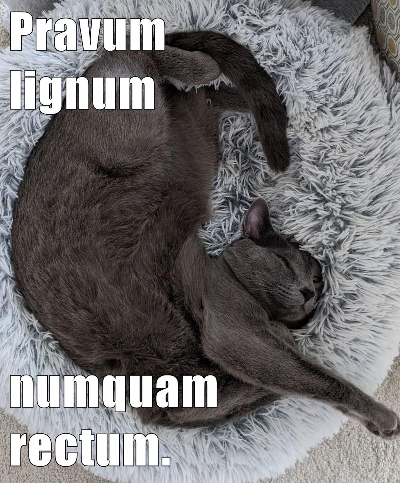The neuter nouns and adjectives that end in -um, like nocumentum and documentum, belong to Declension 2, together with the masculine nouns that end in -us. All the sayings today have neuter nouns and adjectives that end in -um.
There are quite a few of these Latin nouns that are used as English words, including spectrum, medium, premium, momentum, forum, atrium, equilibrium, vacuum, delirium, moratorium, rostrum, and on and on. There are so many of these Latin -um words in English that they don't even feel like Latin anymore, even though they really are neuter Latin nouns and adjectives that have been adopted into English.
(Later this week, we'll do some neuter nouns from Declension 3 that have different endings.)
So, here are today's sayings:
1. Rarum carum.
(Something) rare (is) valuable.
rarum carum
You've seen the feminine form of the adjective rara before: Amicus res rara, and Amicus verus rara avis. What you see here is the neuter form: rarum, and it is being used substantively, as a noun: a rare thing, something rare.
So, here are today's sayings:
1. Rarum carum.
(Something) rare (is) valuable.
rarum carum
You've seen the feminine form of the adjective rara before: Amicus res rara, and Amicus verus rara avis. What you see here is the neuter form: rarum, and it is being used substantively, as a noun: a rare thing, something rare.
The adjective carum, "dear, precious, valuable," can mean something that is emotionally dear but also something dear as in costly, expensive. In old-fashioned English, "dear" still had that sense of "expensive," but that meaning is not so common now. You've already seen a Latin noun formed from this adjective, caritas, in the saying: Ubi caritas et amor, Deus ibi est.
The charm of this saying in Latin is that it rhymes!
2. Medium certum est.
(The) middle is secure.
ME-di-um certum est
You've seen the masculine form, medius, before, and in a saying very similar to this one: Locus medius tutus est. You've also seen a Latin noun formed from this root, mediocritas, in the saying: Mediocritas optima est.
2. Medium certum est.
(The) middle is secure.
ME-di-um certum est
You've seen the masculine form, medius, before, and in a saying very similar to this one: Locus medius tutus est. You've also seen a Latin noun formed from this root, mediocritas, in the saying: Mediocritas optima est.
The adjective certum means "certain, sure, secure." You can see this Latin root in English words like "certain" and "certify."
The idea here is that extremes are dangerous; stick to the middle, not too much, not too little. For more about this idea, see Wikipedia: Golden Mean. There is also an article in Wikipedia on the Goldilocks Principle, based on the story of the "Three Bears," where Goldilocks prefers the porridge that is not too hot, and not too cold, but in-between, etc.
3. Nullum malum impunitum.
No wrong (deed is) unpunished.
nullum malum impu-NI-tum
You have seen several sayings with the masculine form, nullus, including: Hodie nullus, cras maximus and Vir quidem unus, nullus est.
3. Nullum malum impunitum.
No wrong (deed is) unpunished.
nullum malum impu-NI-tum
You have seen several sayings with the masculine form, nullus, including: Hodie nullus, cras maximus and Vir quidem unus, nullus est.
You have also seen the masculine form, malus, in these sayings: Semel malus, semper malus and Nullus dies omnino malus.
The adjective impunitum is a compound: im-punitum, "un-punished." You can see this Latin root in English "punish" and "punitive."
4. Nullum mendacium semper occultum.
No lie (is) forever hidden.
nullum men-DA-cium semper oc-CUL-tum
The noun mendacium is a "lie," and you have seen a related word earlier in this saying: Mendax fama.
4. Nullum mendacium semper occultum.
No lie (is) forever hidden.
nullum men-DA-cium semper oc-CUL-tum
The noun mendacium is a "lie," and you have seen a related word earlier in this saying: Mendax fama.
You have seen the word semper already in this saying: Avarus semper est pauper.
The adjective occultum, "hidden," gives us the English word "occult."
Compare the English saying, "The truth will out."
5. Pravum lignum numquam rectum.
Crooked wood (can) never (be) straight.
pravum lignum numquam rectum
The adjective pravum means literally "crooked," and it also has the same negative connotation as English "crooked." You can see this Latin root in the English word "depraved."
5. Pravum lignum numquam rectum.
Crooked wood (can) never (be) straight.
pravum lignum numquam rectum
The adjective pravum means literally "crooked," and it also has the same negative connotation as English "crooked." You can see this Latin root in the English word "depraved."
The noun lignum means "wood," and it can also mean "a piece of wood," which is the meaning here. You can see the Latin root in the English word "ligneous."
You've seen the word numquam already in this saying: Carcer numquam pulcher.
Latin rectum means "straight, right," and it also has the same moral connotation as English "right." You can see this Latin root in English words like "correct" and "rectify," and it also gives us "rectum."
This saying is literally about how a piece of wood or a branch that is crooked cannot be straightened, but metaphorically, it refers to someone who is "crooked" (i.e. bad, devious, depraved, criminal), asserting that the crooked person will never act rightly; the criminal will never "go straight" as we say in English.
Here's a recap:
And here is today's audio:
Plus the LOLCats!
Here's a recap:
- Rarum carum.
- Medium certum est.
- Nullum malum impunitum.
- Nullum mendacium semper occultum.
- Pravum lignum numquam rectum.
Plus the LOLCats!





No comments:
Post a Comment
Comments are limited to Google accounts. You can also email me at laurakgibbs@gmail.com